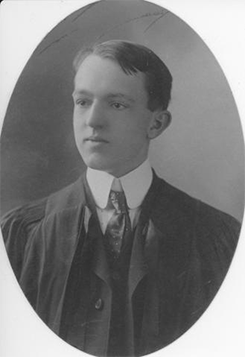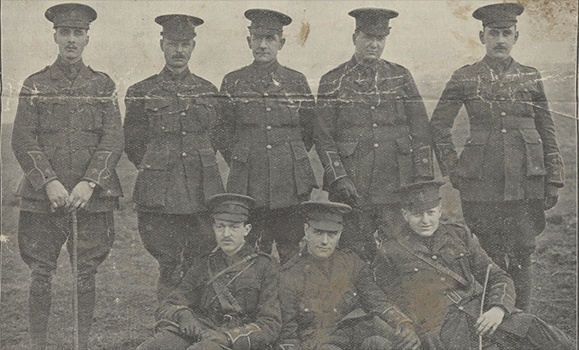A Canadian soldier by the name of Owen B. Jones was setting up a machine-gun position in a trench in France in late 1915 when a half-buried object peeking out of the mud caught his eye.Ěý
Jones, clad in a gas mask that morning due to a threat of attack by the Germans, grabbed a shovel and cleared away the dirt. What he revealed was an issue of the HÂţ» Gazette dated Nov. 15, 1915, published just a few weeks prior far from the frenzied frontlines in France.Ěý
The discovery felt like an odd coincidence for Jones, an alum of the Halifax-based school.
"Where it came from, or by whom it was owned, I know not," Jones later wrote in a note to Archibald MacMechen, Munro Professor of English at Dal, to whom he sent the muck-stained issue for posterity's sake.
Though the paper's voyage to the trench wasn't clear, the headline emblazoned across the front page was:Ěý
George William Stairs: The First Dalhousian to Fall for Empire
Click the image above to examine a digital copy of the issue, housed in the HÂţ» Archives
The article that followed — obscured in a few places by dusty brown splotches — chronicled Stairs's connections to the university as an alum and how he came to sacrifice his life in the fight against Germany and its allies.
George was one of several members of the Stairs clan with close ties to Dal. His uncle John F. Stairs, a local merchant in Halifax, is described in the article as a "true friend" of Dal who gave generous gifts to the university and served as chair of its Board of Governors. And George’s cousin, Gilbert, was the university’s first Rhodes Scholar.Ěý
 George was no slouch when it came to academics either.ĚýHe attended Dal from 1904-1908, graduating with a Bachelor of Arts degree with Great Distinction for setting a new academic record with his marks.Ěý
George was no slouch when it came to academics either.ĚýHe attended Dal from 1904-1908, graduating with a Bachelor of Arts degree with Great Distinction for setting a new academic record with his marks.Ěý
Shown left: George Stairs.
Seven Stairs men in all attended HÂţ» and all served in the war effort, too. Four of them died overseas in active service, George having the unhappy distinction of being the first.Ěý
"War came upon the world like a deluge. Canada flew to arms instinctively. In the first mobilization, George Stairs was among the very first," writes the author of the Gazette article, who is unnamed but may be then-editor-in-chief, Neil M. Rattee. "With no wild, blind enthusiasm, but quietly, deliberately, without fuss or useless talk, he made his choice. He was free, he had no one dependent on him. He was, as he said himself, one of those who ought to go."
George had corresponded by letter with the author from Salisbury Plains shortly before his death, asking about HÂţ» and making the case that Canada had 'done pretty well' with its contributions to the war effort. He argued this performance would enhance the country's independence from Britain — a country on which it was still fairly dependent at the time.
"Canada has 'done pretty well,'" wrote the author, "and George Stairs was one of the thousands of our very finest manhood who have had their part in that great doing."
And through that hell, our Dalhousian fought until death came, in a flash.
Shortly thereafter, George was on the move with his regiment. "From Salisbury Plain to that great April day in Flanders when the Canadians by their steadiness and devotion saved the doubtful battle, as their Commander-in-Chief, and their comrades testified. They did all men could do. They stood like rocks, or charged like mountain torrents, as the need arose; and they fought without water, without food, without relief through four long days and nights."
It was there that the Dal alum met his end.
"They jeopardized their lives to the death in the high places of the field. The losses of the glorious First Division in those great days were more than one man in every three. And through that hell, our Dalhousian fought until death came, in a flash."
View the found in the trench and a subsequent article — — on page one of the Feb.1, 1916 that details its discovery by Owen B. Jones.

